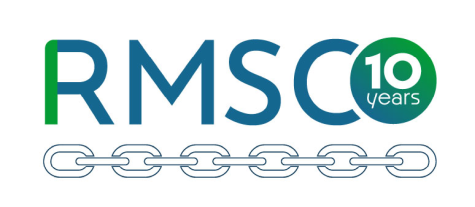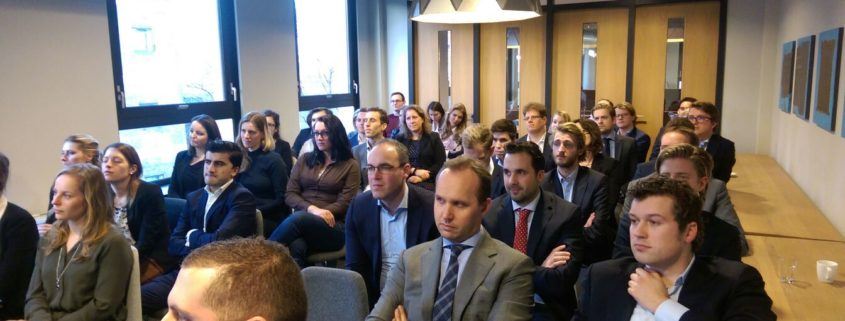Masterclass recap : Enter blockchain ; digitization in ports and shipping
Transparency a faster flow of data, faster status updates; this is what operators in the ports and shipping industry are dreaming of, while sharing data and opening the books for others is one’s greatest fear. Enter the blockchain! On November 23, RMSC and STC Group organised a Masterclass about blockchain and how it is likely going to provide the backbone for digitization of ports and shipping. STC Group organisor Maurice Jansen wrote the recap for this event:
According to both IT and industry experts, blockchain has huge potential. Blockchain is a revolutionary new way to make transactions transparent. Whereas blockchain was initially approached with a lot of scepticism, as its use was associated with internet currency bitcoin, nowadays it is heralded as the single biggest breakthrough since the arrival of the internet. Not in the least the financial institutions are spending huge amounts of money and blockchain is now jumping over to the physical world of supply chains, without having to have a trusted third party or supervisory body.
Both Aljosja Beije (BeScope) and Alfred Botterhuis (ABN AMRO) acknowledged that the potential is huge. Much of the possibilities are yet to be explored, while there are hardly any use cases at the moment. Aljosja Beije who is currently quarter master for setting up a Fieldlab for Blockchain applications in Rotterdam provided the basic understanding of blockchain. Beije emphasized two main features of blockchain technology which hold the promise of really making a profound impact on today’s supply chains. For one, it is a transparent, resilient and fully automated way to keep track of endlessly complex chains of transactions — commonly found in (international) supply chains. Secondly, blockchain technology enables peer to peer transactions by an open source trust system: cutting out the middle man leads to higher efficiency, but also offers new ways of peer to peer financing thereby sourcing new capital for growth and innovations. What’s fundamentally different with previous supply chain visibility technology is that with blockchain, there is no longer a need for a dominant member that holds the truth within his central database, neither is there a need to reconcile between data stored in one company’s database versus the data stored in the others. Instead, data is shared among the members (of a supply chain) following a consensus model of the truth. The verification of the truth is done using crypto technology, the strongest computers — the nodes in the network — solve cryptographic puzzles which are required to ensure the safety of the consensus process. These nodes harvest transactions on the platform and are then rewarded for solving the puzzle. Although not discussed in detail, Beije also mentioned ‘smart contracts’ as a crucial element to this blockchain’s power. Smart contracts allow for automatic transactions on the blockchain, such as status updates or the handover of good between different legal entities.
Halfway the Masterclass Alfred Botterhuis took over from Aljosja Beije. Botterhuis is currently working on a supply chain finance solution, taking the supply chain of flowers from Kenya to The Netherlands as a case study.
In a basic international trade transaction there are 10 different parties involved and at least 30 documents. Current trade is not transparent, the amount of documents represents the level of distrust in the supply chain, while it is actually the information that matters, not the document itself. Blockchain enables a new trade ecosystem which is no longer based on a sequential exchange of information, required for the financial flow. Information flows circular. ABN AMRO thought of reshaping the current letter of credit procedures by putting it on the blockchain. Main exporters whom the bank has proposed this idea are actually worried about two things: do I get paid, and will I get paid in time. In financial terms, this is often referred to as the cash-to-cash cycle (CCC or cash conversion cycle). By decoupling the payment date (of the importer) from the collection date (by an exporter), the cash conversion cycle can be drastically reduced, while it is also possible to free up working capital in the buyer’s cash conversion cycle by deferred payment. The bottom line is that the supply chain runs on the blockchain, which allows for real-time track and trace of financial transactions ànd they phycial flow using digital consignment notes. The pilot is currently done in The Netherlands for road transport only. At a later stage more countries and transport modes are added to the proposition.
At the end of the two presentations, the audience was full of questions and a lively discussion started whether today’s traditional shipping industry could really go paperless, as there is so much distrust and so many parties making a business out of in transparency. Beije answer was promising: this is exactly what we’re aiming for in the Fieldlab Blockchain, develop use cases and new ways of working that will drive our thinking on digitization of ports and shipping further. The industry needs a testbed for such innovations.





